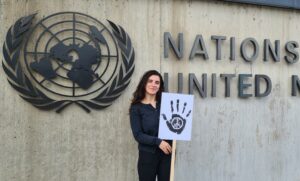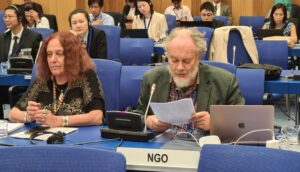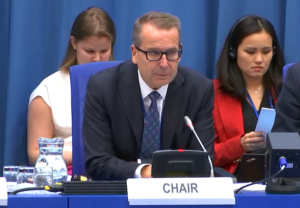Contribution to the webinar: “Nuclear Risk Reduction and Disarmament: Is it time for no-first-use policies in the USA and globally?” by Uta Zapf, April 29, 2021
This year 2021 began with hopeful signals. Joe Biden was inaugurated as President of the United States. The Treaty for the Prohibition of Nuclear Weapons went into effect, the New Start Treaty was prolonged, the negotiations on preserving the Joint Cooperative Plan of Action (Iran nuclear deal) started in Vienna and US Democrats introduced the No-First-Use Act.
Now it will be crucial how the international community supports and reacts to these policies.
The rising risks of nuclear war – intended or unintended by miscalculation or accident – must be urgently addressed. I fully support the concept of implementing a no-first-use policy.
We must embrace the opportunity which the new government of the United States offers to the international community. The administration of Biden currently is carrying out a nuclear posture review that should “reduce the role of NW in our defense strategy”. Biden announced during his campaign: “We will address the existential threat posed by NW. We will head off costly arms races and reestablish our credibility in arms control.”
And he already has delivered by prolonging NEW START. He also declared to pursue new arms control arrangements.
The introduction of the No-First-Use-Act by Elisabeth Warren and Adam Smith in US Congress raises hope for substantial progress in nuclear issues. We all remember the discussions in 2016 when Obama considered a no-first-use policy and finally backed down. In 2016 the government of Japan and others opposed these plans because they were worried that they would undermine the credibility of the nuclear deterrence provided to Japan and other allies. You can be sure this argument will come up again this time within NATO and other allies as it prevailed in 1998 when foreign Minister Joschka Fischer proposed a no-first-use policy to NATO and was rejected and humiliated by all allies.
All of us carry responsibility to exert pressure on our governments to promote the idea of no first use of nuclear weapons. If you look at the polls all over the world, 80 percent of people want a world without nuclear weapons. People are aware of the humanitarian dimension of the use of nuclear weapons and know the opinion of the International Court of Justice of 1996.
One first step to get nearer to the goal of a nuclear free world will be the cutting of budgets for modernization of NW and refraining from planning new nuclear weapon designs. The Biden administration is presently conducting a re-examination of the high level of spending for nuclear weapons modernization. There is an ongoing controversy in US Congress whether modernization of the whole triad of NW is necessary – including ICBMs. Alarmist reports of a nuclear modernization build-up in Russia and China by the Head of Strategic Command (Admiral Charles Richard) try to move lawmakers into consent for a huge military nuclear modernization program and build-up. We will see how the administration will decide and how Senate will vote. It will be a landmark decision on whether to choose a new nuclear arms race or decide on prospects of nuclear disarmament.
The US should grasp the opportunity to at least declare a moratorium on modernizing and offer new negotiations to Russia and China, including restrictions on modernization and development of new designs of NW. In this context, it would be a significant gesture and signal by the US if it declares a No-First-Use.
The post-New Start negotiations must go on and they should include tactical nuclear weapons. Considering the fact that Russia has consolidated its tactical NW at central storage facilities and removed them from its ground forces, as Jessica Cox, director of NATO’s nuclear policy directorate, confirmed in a June 2020 report, this could be a unique opportunity to suspend or cancel the deployment of modernized B61-12 gravity bombs in Europe. In addition, a moratorium on introducing new destabilizing weapons to Europe would be helpful. Russia has proposed a moratorium on nuclear and conventional armed medium- and intermedium-range missiles in Europe and is willing to discuss cuts to tactical NW, if US nuclear weapons are only deployed on US territory. NATO has declared it will not deploy new ground based NW in Europe but still insists on air-based B61-12 gravity bombs to sustain extended nuclear deterrence and nuclear sharing in Europe as declared in the Strategic Concept of 2010. Germany agreed to this concept in 2010 although at this time the coalition government had agreed on removing US NW from German soil.
At that time the Belgian Parliament, the Deutsche Bundestag and the Netherlands had come out in favor of such a removal. Germany by that time was governed by a coalition of CDU/CSU and Liberals. The Deutsche Bundestag passed by common consent and carried by all parties) a resolution asking for the removal of US NW from German soil and for support for discussions at the UN on the Ban Treaty.
We should not again miss the chance on progress in arms control and disarmament in order to strengthen stability in the world.
There are substantial obstacles to be overcome. One of them will be to achieve a positive outcome of the Review Conference of the NPT postponed to 2021. One very big obstacle is Great Britain’s declaration to expand the nuclear arsenal of Trident warheads to a ceiling of 260 from formerly 180. This is an intended increase of 40%! This means revoking Great Britain’s obligations out of Article VI of the NPT. GB also terminates its obligation for transparency on operational deployments. Even more dangerous is PM Johnsons’ assertion of the right to use nuclear weapons in response to non-nuclear attack. This obviously increases the danger of a first use. This announcement can mean trouble with NATO partners as it is not in line with NATO provisions and can evoke disaster for the outcome of the Review Conference. It will cause trouble with non-nuclear weapon states who are already frustrated by the P5s non-commitment to nuclear disarmament. But allies and NATO partners should also be disturbed by this behavior of a nuclear weapons state endangering the NPT and thus encouraging non-nuclear weapon states to acquire NW themselves. The only voice from NATO member states I heard criticize these plans was of Foreign Minister Heiko Maas of the Social Democratic Party of Germany. In fact these changes undermine the current nuclear policy of the alliance not to use NW against non-nuclear weapon states adhering to their obligations out of the NPT.
To make the Review Conference of the NPT a success and avoid disaster as in 2015, when no agreement on a Final Document could be achieved, we have to take a closer look at the Final Document of the year 2000 with the important 13 Steps and at the Final Document of the year 2010 with its 64-Actions-Program.
From the 13 Steps the following issues are still not finished:
- Achieve entry into force of the Nuclear-Test-Ban-Treaty.
- Conclude a Fissile Material Cut Off.
- Establish a subsidiary body in the Conference of Disarmament to deal with nuclear disarmament.
- Fulfilment of the commitments of nuclear weapon states to obligations out of Article VI.
- Step nr. 7 referred to strengthening the ABM Treaty. As the ABM Treaty has been canceled by President George W. Bush we should urgently suggest to take up negotiations on missile defenses and their limitation. Missile defenses are driving the nuclear arms race. A new ABM-like accord is needed.
- Unilateral reductions of arsenals, more transparency and confidence building measures, a diminished role of nuclear weapons in security policies and de-alerting of NW, as Step 9 demands.
- Verification capabilities must be developed to provide assurance of compliance with nuclear disarmament.
All these unfulfilled steps are included in the 64 Points Action Plan of 2010. In addition we find very important ideas how to strengthen security assurances to non-nuclear states given by the P5 states in UNSCR 984 (1995) not to use nuclear weapons against non-nuclear weapon states adhering to their obligations out of the NPT, including a proposal to make negative security assurances legally binding.
There also can be found a proposal to support considerations of a nuclear weapons convention!
Doomsday Clock is very near midnight.
Adoption of a no-first-use policy will only be a first step and a door-opener for an urgently needed dialog on the role of NW in military doctrines and strategies. Nuclear doctrines differ and have been changed over time.
Russia from 1982 until 1997 had a declared no-first-use policy when it changed it to a strategy of using NW in case the existence of the state was in danger. In 2000 Russia changed the strategy to use nuclear weapons if there were no other means or the means had proven ineffective to protect the survival of the state.
France even provides for preemptive use as a “last warning” and intends to use NW against chemical and biological attack.
This clearly undermines the two other conventions on weapons of mass destruction, the Chemical Weapons Convention and the Biological Weapons Convention.
Great Britain has just announced it would use NW against chemical and biological aggression too.
China from the beginning of its possession of NW declared a no-first-use and confirmed it in 2005. Besides it used to store the warheads separated from launchers. China as early as 1994 also proposed negotiations on a Treaty on the No-First Use of Nuclear Weapons. US intelligence community said to have gathered information that China moved some of its nuclear forces to “launch on alarm”.
If the US declared a no-first-use policy this would make it easier to hold negotiations on doctrines and nuclear postures. But it seems to be high time to act to prevent the whole consent on the non-usability of NW from collapsing.
Doomsday Clock will move on if we don’t act. To halt it, every action mentioned before is necessary.
But this will still not be enough. In addition we will have to negotiate reductions on conventional weapons, start preventive negotiations on restraints of the development of new technologies in weapon systems, and we have to revive the dialogue between NATO and Russia. It is imperative we reinstall NATO-Russia Council and recall the NATO-Russia Founding Act of 1997. We have to save the Open Skies Treaty and find new ways of building confidence and trust and transparency.
As obviously missile defenses and their restrictions are key to halting a new arms race, it is of paramount importance to take them to the negotiation table.
The OSCE must be revived as a perfect place to talk about peace and security in Europe. In 2008 the Corfu Process started within OSCE to discuss a new security architecture for Europe with then Russian President Medvedev. This process should be freed out of the ivory tower of science where it lies buried today. This will not be easy, taking into consideration the current condition of relations between Russia and the West after what happened since the annexation of Crimea and the war with Ukraine since 2014.
We have to stop the move forward of the Doomsday Clock.




